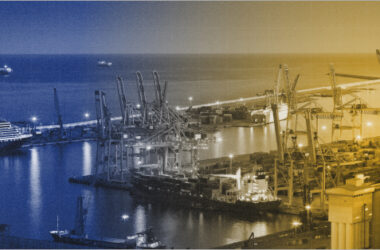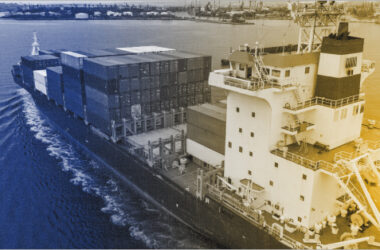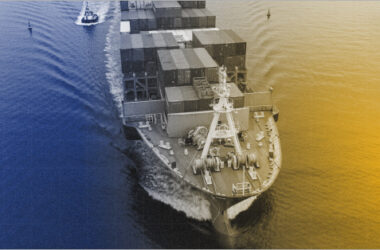From unpredictable weather to cargo mishaps and vessel damage, the marine industry faces challenges that can sink unprepared businesses. Are you confident your business is protected against such uncertainties? Many entrepreneurs in India underestimate the importance of Marine Insurance until it’s too late. But safeguarding your assets doesn’t have to be complicated. This guide unravels everything you need to know about Marine Insurance for your business. Here, we will break down the essentials, simplifying the jargon and ensuring your investment is secure against the unexpected. Ready to chart a safer course for your business? Let’s dive in!
Marine Insurance: A Brief Overview
Marine Insurance is a specialised type of insurance that protects businesses from financial loss related to the transportation of goods. It covers loss or damage occurring during transit, whether by sea, air, or land. Marine Insurance ensures your cargo’s safe passage and protects your investment against various risks.
Key Risks Covered by Marine Insurance Policies
- Natural Disasters: This insurance coverage provides protection against storms, hurricanes, and other weather-related incidents.
- Accidental Damage: Coverage for loss or damage due to collisions, overturning, or sinking.
- Theft and Pilferage: Marine cargo insurance provides financial security in case of stolen or tampered goods.
- Improper Handling: This insurance provides coverage for damages caused during loading and unloading.
- War and Piracy Risks: Some marine cargo policies offer protection against geopolitical risks.
Types of Marine Insurance Policies
Understanding the types of Marine Insurance policies is essential to tailoring coverage for your business:
1. Marine Open Insurance
- Covers goods during transit by sea, air, rail, or road.
- Offers continuous coverage for all shipments under one policy
- Protects the cargo against risks like theft, damage and loss throughout the transit journey
- Simplifies the process and saves time by ensuring seamless protection for all shipments under a single policy
2. Single Transit Insurance
- Covers a specific shipment or consignment during a single journey
- Offers financial protection against risks such as damage, loss or theft of goods during the journey from the starting point to the final destination
- Ideal for shipping companies and vessel owners who ship goods occasionally and do not need continuous coverage.
3. Sales Turnover Policy
- Here, businesses insure their estimated annual sales turnover, which becomes the sum insured.
- Ensures coverage for all transits needed to achieve this estimated turnover
- Premiums are calculated based on the total sales turnover, offering cost-effective coverage for all transits.
Scope of Marine Insurance
The transit clause in Marine Insurance defines when the coverage starts or ends during the transportation of goods. There are three distinct phases in this clause:
- Start of Coverage:
Coverage begins when the goods are first moved from their origin ( a warehouse, supplier’s premises or a factory), for immediate loading onto the transport vehicle or vessel.
- During Transit:
Goods are insured while in transit via the agreed modes ( sea, air, road or rail). Intermittent storage is covered, provided it is part of the normal course of the journey.
- End of Coverage
Coverage stops upon:
- Delivery of the goods to the final destination
- Storage in a warehouse for purposes other than immediate transit
- Expiration of a specified time period ( usually 30 to 60 days) after arrival at the destination.
Why Do Businesses in India Need Marine Insurance?
India’s thriving trade environment and reliance on imports and exports make Marine Insurance coverage indispensable for businesses. Here are the key reasons why businesses need these insurance policies:
- Protection Against Natural Disasters: India’s geographical location makes its trade routes prone to cyclones, monsoons, and other natural calamities. Marine Insurance provides coverage for damages caused by such events.
- Coverage for Cargo Damage: Goods in transit by sea, air, or land are vulnerable to damage or loss due to mishandling, moisture, or accidents. This insurance coverage ensures financial compensation for such incidents.
- Mitigation of Piracy Risks: Indian trade routes often cross piracy-prone areas. Marine Insurance provides coverage for losses caused by piracy or hijacking.
- Compliance with Legal Requirements: Many countries may mandate Marine Insurance policies for international trade to comply with regulatory and contractual obligations.
- Protection Against Theft: Cargo theft during transit can lead to substantial losses. Marine cargo insurance provides coverage to recover the value of stolen goods.
- Customisable Coverage: Businesses can tailor Marine Insurance policies to include specific risks, such as warehouse storage, inland transit, or particular types of goods.
- Risk Management for SMEs: Small and medium enterprises (SMEs) often operate on tight margins. Marine Insurance ensures they aren’t crippled by unforeseen losses.
- Peace of Mind: Knowing that potential losses are covered allows businesses to focus on operations and growth rather than worrying about risks.
Factors to Consider Before Buying Marine Insurance for Your Business
- Assess Risk Exposure
- Evaluate the nature of your goods (e.g., perishable items, high-value goods) and their susceptibility to damage or theft.
- Consider the routes and modes of transport, as some are riskier than others.
- Choose a Reputable Insurer
- Look for Marine Insurance providers with a strong financial standing, good reviews, and a proven track record of handling claims efficiently.
- Look for Marine Insurance providers with a strong financial standing, good reviews, and a proven track record of handling claims efficiently.
- Compare Policies
- Analyse different policies based on premiums, coverage, deductibles, and additional features. Don’t compromise on essential insurance coverage for a lower premium.
- Analyse different policies based on premiums, coverage, deductibles, and additional features. Don’t compromise on essential insurance coverage for a lower premium.
- Regulatory Compliance
- Ensure the Marine Insurance Policy complies with Indian laws and international trade regulations. This is especially crucial for exporters and importers engaged in cross-border transactions.
- Ensure the Marine Insurance Policy complies with Indian laws and international trade regulations. This is especially crucial for exporters and importers engaged in cross-border transactions.
- Consult Experts
- Engage with insurance brokers or consultants who can guide you through the nuances and recommend the best options.
The Process to File a Marine Insurance Claim
Here’s a step-by-step guide to filing a Marine Insurance claim:
- Notify the Insurer Immediately
- Inform your insurance company as soon as the incident occurs.
- Provide the necessary details, such as the policy number, date, time, location of the incident, and a detailed description of the damage or loss.
- Minimise Further Loss
- Take reasonable steps to prevent further damage or loss. For example, secure the cargo or vessel, if possible, to avoid worsening the situation.
- Take reasonable steps to prevent further damage or loss. For example, secure the cargo or vessel, if possible, to avoid worsening the situation.
- Document the Incident
- Gather evidence to support your Marine Insurance claim, including:
- Photographs or videos of the damage.
- A detailed description of the incident.
- Witness statements, if applicable.
- Gather evidence to support your Marine Insurance claim, including:
- Lodge a Formal Claim
- Submit a written claim to the insurer with all required details. Include:
- Policy documents.
- Copies of the shipping documents (bill of lading, invoice, etc.).
- Proof of ownership or interest in the insured property.
- Submit a written claim to the insurer with all required details. Include:
- Survey and Assessment
- Allow the insurer or their appointed surveyor to inspect the damage.
- Cooperate with the surveyor by providing access to the damaged property and answering questions.
- Submit Supporting Documents
- Depending on the nature of the claim, provide:
- Surveyor’s report.
- Proof of expenses incurred to mitigate losses.
- Incident reports (e.g., captain’s report for vessel damage or port authority report for port-related incidents).
- Depending on the nature of the claim, provide:
- Claim Evaluation
- The insurer assesses the claim based on the survey report, policy coverage, and submitted documents.
- The insurer assesses the claim based on the survey report, policy coverage, and submitted documents.
- Settlement of Claim
- If the claim is valid, the insurer will process the settlement.
- You will receive the compensation as per the policy terms and agreed-upon conditions.
- Review the Settlement
- Cross-check the settlement amount with the insurance coverage on offer and ensure all agreed terms have been met.
- Cross-check the settlement amount with the insurance coverage on offer and ensure all agreed terms have been met.
- Follow-Up, If Necessary
- If you believe the settlement is insufficient or unfair, raise your concerns with the insurer.
- Escalate to an insurance ombudsman if a resolution isn’t reached.
By following these steps carefully and promptly, you can streamline the process and maximise the chances of a successful claim settlement.
Final Thoughts:
Marine Insurance is an invaluable asset for businesses operating in India’s dynamic trade environment. By understanding the various types of policies, evaluating insurers, and addressing common challenges, you can secure your business against potential transit risks. Remember, the right Marine Insurance Policy is not just a safety measure but a strategic investment in your business’s growth and stability.
Ready to safeguard your business with Marine Insurance? Research providers, compare policies, and consult experts to find the best fit for your needs. Protect your cargo and secure your financial future today!








